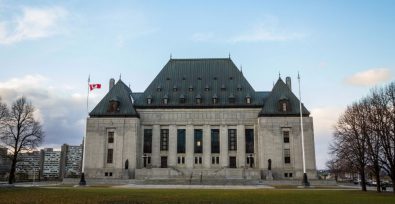In a disappointing decision, the Supreme Court of Canada reaffirms its stance on criminalization of sex work. The ruling of R. v. Kloubakov once again silences the very people most affected by these laws.
The decision comes months after the Court refused to hear submissions from 23 sex worker-led organizations and migrant advocacy groups. Shockingly, the court claimed their insights were “irrelevant.” Now, with the judgment delivered, the implications are clear. Canada’s sex work laws will continue to criminalize safety and perpetuate vulnerability to abuse, exploitation, and trafficking.
Criminalizing protection and pushing workers underground
While selling sexual services remains legal in Canada, nearly every element of doing that work—including purchasing services or communicating for that purpose—is criminalized. The result is a paradox: sex work is “legal” on paper, but virtually impossible to do safely or openly.
Under the Protection of Communities and Exploited Persons Act (PCEPA), anyone who “receives a material benefit” from sex work—including drivers or security staff—can be criminally charged. This is precisely what happened in R. v. Kloubakov, where two men working as drivers for an escort agency were convicted under these provisions.
Advocates have long argued that such laws harm sex workers by forcing them to work in isolation and avoid protective measures for fear of police surveillance, arrest, or deportation. These laws not only increase risk but also reinforce stigma, discrimination, and vulnerability to violence and exploitation.
As Teena Orchard, professor of health studies and author of a recent article for The Conversation, explains:
Criminalization isolates sex workers from society and resources, and positions them as targets for violence, discrimination and labour exploitation. It also contravenes regulatory approaches from the United Nations Human Rights Council, which views the criminalization of sex workers as a form of gender-based discrimination and advocates for a human-rights framework that aligns with decriminalization.
Ignoring lived realities—again
In its unanimous decision, the Supreme Court failed to meaningfully consider the lived realities of sex workers. The ruling treats issues of safety, dignity, and human rights as secondary. This is a reflection of what sex worker advocates describe as a pattern of exclusion and disregard.
Research shows that criminalization leaves sex workers reluctant to contact police, even after violent attacks, due to fears of being outed, racially profiled, or deported. This is especially true for migrant and racialized sex workers, who face disproportionate targeting.
As Orchard writes,
Decisions about sex workers’ rights under the Charter of Rights and Freedoms should not be made without sex workers at the table.
Upholding inequality under the guise of protection
Canada’s current approach, modeled after the Nordic Model, frames criminalization as a means of protecting people from exploitation. But evidence from countries like New Zealand and Belgium, where sex work has been fully decriminalized, shows the opposite: decriminalization strengthens safety, agency, and equality.
The United Nations Human Rights Council has also recognized that criminalizing sex work is a form of gender-based discrimination and has called for human-rights–based approaches that prioritize worker safety and autonomy.
By upholding PCEPA, Canada stands increasingly out of step with these global standards—and with its own commitments to equality under the Canadian Charter of Rights and Freedoms.
Calling for decriminalization
Decriminalization doesn’t just protect workers’ safety—it helps dismantle systems that enable exploitation and trafficking in the first place. When sex workers can operate openly, access resources, and report abuse without fear, everyone is safer.
Canada’s highest court may have turned its back on sex workers’ rights for now, but advocates across the country and around the world are not giving up. In the state of Illinois, advocates have introduced a bill that calls for the full decriminalization of sex work in order to end exploitation and ensure dignity for all workers. Sign our petition calling for this important bill to pass.







Freedom United is interested in hearing from our community and welcomes relevant, informed comments, advice, and insights that advance the conversation around our campaigns and advocacy. We value inclusivity and respect within our community. To be approved, your comments should be civil.